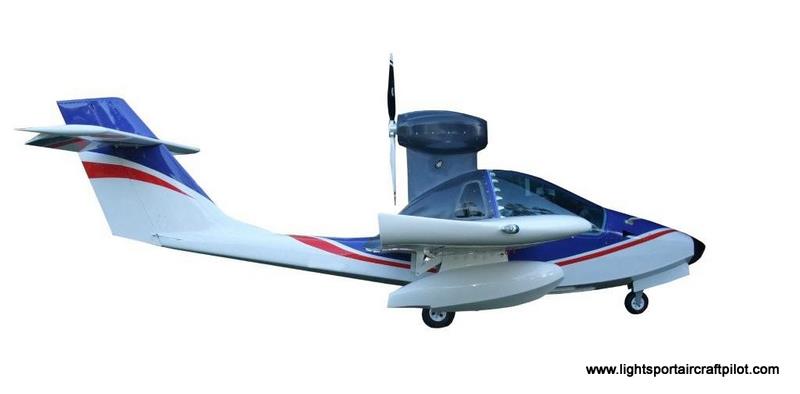Mermaid M6 amphibious
light sport aircraft, Mermaid M6 amphibious experimental light sport aircraft, Light
Sport Aircraft Pilot News
newsmagazine.
|
Light Sport Aircraft Pilot is a directory of aircraft that generally fit
into what are described as ultralight aircraft, advanced ultralight
aircraft,
light sport aircraft, experimental light sport aircraft, experimental
aircraft, amateur built aircraft, ELSA or homebuilt
aircraft in the United States and Canada. These include
weight shift aircraft, more commonly known as trikes,
powered parachutes, and powered para-gliders.
|
|
|
|
|
|
|
|
Mermaid M6 amphibious light sport aircraft, experimental
lightsport, amateur built aircraft.
|
|
Mermaid M6 Manufacturer/Distributor
WETAERO, INC
PO BOX 1007
Palm City FL. 34991
(772) 597-2443
www.wetaero.com
A little bit of history before we explain our current engine
installation. In the beginning, approximately four years ago
during the very early stages of prototype 1, we used the
Rotax 100HP as the power plant.
We were able to do all of our initial flights and water
tests using this early installation. |
|
|
|
We refined this installation
over the next two years with probably no less than 6
different configurations using the Rotax. After essentially
complete redesign of the prototype number one here in the
U.S. we continued with this power plant for the next one and
half years of performing flight and water testing with good
results. We were able to achieve good cooling although we
utilized secondary cooling for low speed in taxiing. Even
though adequate in horsepower we thought performance should
be better on hot and heavily loaded days, we also realized
we had propeller inefficiencies from some of the after body
aerodynamic interference.
During one of our demo flights
a customer from Australia suggested we might have better
performance if we work to utilize the Jabiru 125 HP power
plant. So we promptly switched gears to try this higher
horsepower alternative, even though it was clear we would
pay a small weight penalty. During initial flight tests this
power plant proved to perform slightly better than the
Rotax. But the installation was still lacking its full
potential until we repositioned the power plant higher above
the after body structure. Much to our amazement this one
modification substantially increased the performance of the
M6. That should have been the end of the story with choosing
power plants, however the Jabiru was a tough engine to cool
in the pusher configuration. To date no one has successfully
produced a production aircraft that can cool well,
especially on a flying boat. Unfortunately we spent almost a
year perfecting this engine installation until we were
capable of running on step taxi without limitations.
But then came the next chapter
of this decision-making process when one of my customers
insisted on the Rotax installation. Although reluctant at
first this customer was politely persistent enough to get me
thinking that we never really finished the Rotax 100HP
installation. We approached this installation with a
different mindset by utilizing more advanced CAD design
applications and CNC processes. We also had a considerable
amount of help from some very experienced aeronautical and
aircraft engineers. This installation slowly materialized
into one of the most sophisticated engine installations I?ve
ever participated with. This design is cleaner and more
efficient than any of its predecessors including some
extremely sophisticated cooling techniques for the pusher
configuration. I?m not going into detail on this mechanism
but it?s enough to say that we can run the power plant at
3000 RPM almost indefinitely with no forward motion. This is
difficult to do on even a standard aircraft let alone the
pusher configuration on a flying boat. Also contributing
factors which led to improvement over the initial Rotax
installation was the fact that the power plant was raised
almost 12 inches. We also hit the sweet spot as far as the
center of thrust intersecting on the tail surfaces, it?s
hard to believe but we use virtually no trim from full power
setting to idle on the elevator. And the last big advantage
is that we are able to swing a huge 70? hollow carbon fiber
Sensenich prop. Below is a photo of the prototype production
cowl that will be used. |
|

Mermaid M6 amphibious light sport aircraft -
experimental lightsport aircraft |
|
|
|
|
|
|
Light Sport Aircraft Pilot News Web Magazine.
You may link to these pages or print
them out for your own personal use.
No part of this
publication may be copied or distributed, transmitted, transcribed,
stored in a retrieval system, or translated into any human or computer
language, in any form or by any means, electronic, mechanical,
manual, or otherwise, without the written permission of Light Sport
Aircraft Pilot News.
By copying or paraphrasing the intellectual
property on this site, you're automatically signing a binding contract
and agreeing to be billed $10,000 payable immediately. Copyright Light Sport Aircraft
Pilot News. Email
|
|